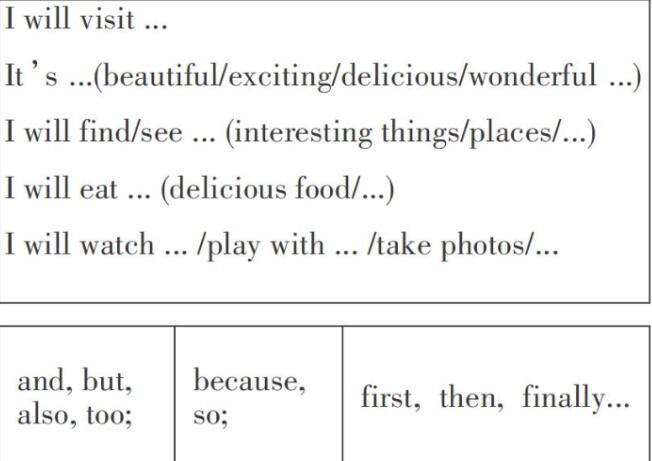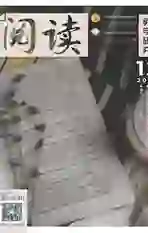小学英语写作指导策略研究
2020-04-06施静静
施静静


【摘要】在《义务教育英语课程标准(2011年版)》的指导下,笔者结合自身的教学经验,以培养学生兴趣为前提,探讨小学英语写作教学的方法与策略,建构快乐、多元的写作课堂,激发学生思维,提高学生综合语言运用能力。
【关键词】小学英语写作 策略 兴趣 思维
英语写作是由语言输入到语言知识整理再到语言输出,最后进行语言反馈、完善的过程。所以教师要注重对学生语言知识量的输入,加强对学生语言知识质的输入,为学生提供大量有意义的、具有可理解性的英语输入材料,强调对学生写作策略培养的输入;要引导学生积极地进行英语写作的输出;要及时给予学生反馈,检验学生的学习效果,完善输出质量,达到提高学生英语写作水平的效果。好的语篇,不等于正确无误的语言,而是好的思维展现。语篇写作重在达意,而不是语法。在指导时,我们要关注四个特点:第一,统一。语篇中的所有细节都说明同一个问题,没有与主题不相关的细节内容。第二,连贯。语篇和谐,符合逻辑,前后关联照应。第三,丰富。有足够的细节支撑主题。第四,简洁。表达简练,没有无关的多余信息,用尽可能少的语言表达尽可能多的内容。下面就从三个方面具体阐述如何进行小学英语写作策略的指导。
一、依托教材,挖掘写作元素
以教材为依托,帮助学生不断积累新知,内化语言;发挥不同版块对学生语言和思维发展的作用。主要写作形式:仿写、扩写、续写等。教师要做到以下三点:
A.借助故事版块给学生大量语言输入(用好教材中的范文);
B.借助语法版块帮助学生积累词汇、规范语言表达;
C.挖掘教材中可得的写作元素。
例如:译林版小学《英语》五年级下册Unit 5Helping our parents(Story time),教师根据语篇的第一段,逐步引导学生从第一稿、第二稿到第三稿进行不断地完善、修改,学生通过对细节、情感、猜测等的添加,对标题的修改,使得文章更具体、更形象、更生动。下文中画线部分内容就是很好的体现。
A Busy Morning
It is Saturday morning. My father is cleaning the blue car in the garden. I am helping him. The car is shiny. My mother is cooking breakfast in the kitchen. She is cooking eggs. They look nice. Helen is in the living room. She is sweeping the floor. We are busy. Where is Tim? What is he doing now? Tim and Ben are sleeping in the bedroom. Tim is sleeping on the bed. He is too little. He needs more sleep. Ben the dog is sleeping on the floor.
教师充分依托故事版块,淋漓尽致地向学生展示了一篇优秀范文,接着要求学生根据书中Checkout time中的图片提示,仿照范文,以It is Saturday Evening为题,续写“晚上篇”。学生的创意精彩纷呈。
二、整合教材,训练写作技能
整合教材,融汇新旧知识,结合学生生活实际开展写作教学,注重对学生写作微技能的训练。主要写作形式:任务式写作。
例如:译林版小学《英语》六下Unit 7 Summer holiday plans单元写作教学,要求学生能用一般将来时谈论自己的暑假出游计划,并运用本课所教的写作策略,以暑假出游计划为主题进行写作,培养学生根据主题建构思维导图,根据思维导图组织写作的能力,提高学生根据写作策略修改、完善作文的能力。在上课一开始,教师直截了当说出自己第一次来到镇湖这个地方,这个地方很美,想游览一下,让孩子们推荐一些有趣的地方给他,学生们的思维一下子被带动起来:
S1: (You can go to) Taihu Lake.Its beautiful.
S2: (You can go to)Taihu Wetland Park.You can fly a kite there.
S3: (You can go to) Chinese Embroidery Art Museum.
接着教师在写作指导时通过四大策略循序渐进的训练,点燃学生的思维火花:
策略一:思維导图,确定内容
【设计思路:问题导向,引出思维导图,演变成短文,提出策略一。】
T: Thank you for your advice. Theyre all wonderful places. I think I will go to Zhenhu in this summer holiday. If I want to make a travel plan, what questions should I think?
S2: How will you go there?
S3: How long will you stay there?
S4: What will you do there?
S5: Who will you go with?
T: Look.This is my writing according to my mind map.
Can you complete it? So heres a tip for you.(思维导图,确定内容。)
策略二:长短结合,避免重复
【设计思路:让学生发现问题,主动思考,提出修改,引出策略二。】
T: Look at my writing. These sentences all start with“I will go”.Theyre the same. Can you put some of them together?
说完,教师呈现以下句子:
This summer holiday,
I will go to Zhenhu.
I will go there by car.
I will go there with my family.
I will go there in July.
I will stay there for two days.
I will visit Taihu Wetland Park.
I will travel around Taihu.
I will eat fish and crabs.
教师引导学生将前面四句合并成:This summer holiday, I will go to Zhenhu with my family by car. 把第五、六句合并成:I will go there in July and stay there for two days.最后三句,教师提供and, but, also, too, because, so,first, then, finally等词让学生将这三句合并,进行不同的表达,学生们一下子脑洞大开。
S1: I will visit Taihu Wetland Park and travel around Taihu. I will eat fish and crabs, too.
S2: First, I will visit Taihu Wetland Park. Then,I will travel around Taihu. Finally, I will eat fish and crabs.
S3: I will visit Taihu Wetland Park. I will also travel around Taihu, because I will eat fish and crabs.
S4: ...
这样一来,不仅句式显得非常灵活,而且也避免了重复。
策略三:发挥想象,丰富细节
【设计思路:逐步引导学生发散思维,拓展内容,提出策略三。】
T: Now,its your time to practice.I know you made a mind map about your travel plan before.Please talk about your travel plan according to Tip 2.
根據策略二,让学生谈谈自己的旅行计划。
T: But look carefully,XX will stay in ...for ... Will he/she go to ... all the days?
T: So I think he/she will do many things in...Lets make a new plan for him/her.
Look, this is the passage. But some words are missing. Lets help him/her complete it,OK?
教师给出一些提示词,让学生发挥想象,丰富细节。
I will do many things in Shanghai. I will go to the Bund. Its at night. I will visit Shanghai Museum. I will go to Disneyland. I will meet Mickey Mouse. I will eat a lot of delicious food.
T: Now its your time to practice. Please say more about your travel plan according to Tip 3. These words and sentences may help you.
S: This summer holiday, I will go to ... I will do many things there. I will ...
策略四:结构清晰,篇章完整
【设计思路:整体呈现短文,理清结构,提出策略四。】
T: Look, this is the title“My Travel Plan”.This is the beginning. Its about“where,when, how, how long, who”.
Its the body. Its about“what”. At last,we need an ending. I will do many things in Shanghai.Will I have a good time? So whats the ending?
S1: I will have a good time in Shanghai.
T: The ending is used to express emotions.We can also say“, I love the city/country.”“I cant wait to visit there”
这样文章就显得结构清晰,篇章完整。学生也就可以根据教师提出的四大策略,开始书写自己的旅行计划,并与同桌分享,相互修改。
三、跳出教材,创新写作视角
跳出教材,丰富写作语料,使写作内容更丰满,句式表达更丰富,写作视角更多元。主要写作形式:主题式创写。
例如:译林版小学《英语》四年级(下册)Unit 5 Seasons。学生在学完语篇小诗之后,教师利用看图说话的形式同学生一起谈谈秋天,得出思维导图:谈论季节可以从天气、感觉、活动、衣服、景物、食物与饮料等方面下手。习作也就能轻而易举地完成:
In summer, it is hot.
I see lovely frogs. I see beautiful butterflies.I eat sweet watermelons. I drink ice lemon tea.
In summer, I wear lovely shirts, cool shorts,colourful dresses. How nice!
Its time to go to the sea. I can go swimming in the sea. Its fun!
Summer is wonderful. I love summer.
教師还将自己的习作展示给学生看,让学生思考,教师写的文章与他们写的有什么不同。
Winter
What colour is winter?
Winter is white. The snow is here and there.
Winter is green. We have Christmas.
Winter is red. We have Spring Festival.
Winter is colourful!
学生的思维浪花被激起,季节还可以抓住颜色来写,不同的视角,让学生脑洞大开,产生了强烈的创作激情,都想一显身手。
小学英语写作训练是个长期而复杂的过程,要求教师有计划、有目的、有反馈,由易到难,循序渐进地进行写作教学指导。教师要充分结合教材内容和学生年龄特点,设计写作任务,加强过程指导,注重策略研究,点燃学生写作的思维火花,努力使学生听、说、读、写的综合语用能力得到全面的发展与提高。
(作者单位:江苏省昆山市开发区晨曦小学)
